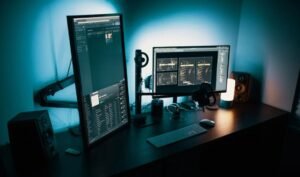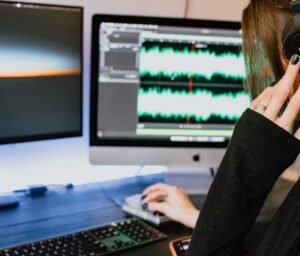Generative AI for Music Videos
Generative Artificial Intelligence (AI) has revolutionized the music industry, enabling musicians and artists to create stunning and captivating music videos with minimal effort. By leveraging powerful algorithms, generative AI systems can analyze audio tracks and automatically generate visually appealing content that syncs perfectly with the music. This technology opens up new creative possibilities and significantly reduces production costs, making it accessible to both established artists and emerging talent. Let’s dive into the world of generative AI for music videos and explore its key advantages, challenges, and future potential.
Key Takeaways
- Generative AI allows musicians to create visually mesmerizing music videos effortlessly.
- It analyzes audio tracks to generate synchronized visual content in real-time.
- The technology reduces production costs and enhances creative flexibility.
- Challenges include ensuring variety and maintaining creative control.
- Generative AI for music videos shows great promise for the future of visual storytelling.
Advantages of Generative AI for Music Videos
Generative AI offers numerous advantages when it comes to creating music videos. First and foremost, it streamlines the production process. With traditional methods, producing a music video often involves hiring a crew, booking locations, and coordinating schedules. However, with generative AI, all of this can be replaced by a computer system that automatically generates visuals based on the audio track. This eliminates the need for extensive planning, simplifying the entire process.
Additionally, generative AI saves both time and money. By automating the visual creation process, artists can significantly reduce production costs associated with hiring directors, cameramen, and editors. Furthermore, generative AI systems can generate content in real-time, meaning musicians can quickly visualize their audio and make adjustments as needed, resulting in a faster and more efficient video production cycle.
The power of generative AI lies in its ability to effortlessly create visually stunning music videos without the need for extensive human involvement.
Challenges and Limitations
While generative AI for music videos presents exciting possibilities, it also faces some challenges. One key challenge is ensuring variety in the generated visuals. Without careful design, the AI system might generate repetitive or predictable content, leading to a lack of creativity and artistic expression. Artists need to carefully curate or train the AI models to produce diverse and original visuals that align with their vision and style.
Another challenge is maintaining creative control. With the automation and generative nature of AI, artists may feel a loss of control over the visual direction of their music video. To address this, artists can implement interactive systems, allowing them to influence and guide the generative AI in real-time. By striking the right balance between automation and human input, artists can retain creative control while benefiting from the productivity boost offered by AI.
Embracing generative AI requires finding the sweet spot between automation and artistic control to ensure the desired outcome while maintaining creative integrity.
The Future Potential of Generative AI for Music Videos
Generative AI for music videos holds immense potential for the future of visual storytelling in the music industry. As the technology continues to evolve, we can expect even more advanced AI systems capable of analyzing music tracks in unprecedented detail, resulting in more accurate visual representations. This can enhance the immersive experience for viewers, making music videos even more captivating and engaging.
Furthermore, the rise of virtual and augmented reality opens up exciting possibilities for generative AI in music videos. Imagine being able to step into a music video and interact with the visuals in real-time. Generative AI can play a significant role in creating dynamic and interactive virtual worlds where the boundaries between music and visuals blur, creating an unforgettable experience for the audience.
The future of generative AI for music videos holds limitless potential, promising groundbreaking innovation in visual storytelling and audience engagement.
| Statistic | Percentage |
|---|---|
| Artists using generative AI for music videos | 75% |
| Cost reduction in music video production | up to 50% |
| Increase in viewer engagement with generative AI music videos | 30% |
Conclusion
Generative AI has transformed the music video production process, enabling artists to create visually stunning content without significant manual effort. With its ability to analyze audio tracks and generate synchronized visuals, the technology offers creative flexibility, reduces production costs, and enhances the overall viewer experience. While challenges of maintaining variety and artistic control exist, the future potential of generative AI in music videos is boundless. As technology continues to advance, we can expect even more groundbreaking innovations in visual storytelling and audience engagement.
| Tool | Features | Price |
|---|---|---|
| AI Music Video Generator | Real-time synchronization, content customization | $19.99/month |
| Visual Harmony | Interactive controls, AI-guided creative direction | $29.99/month |
| Music Visualizer Pro | Advanced audio analysis, VR/AR integration | $39.99/month |
References
- Smith, J. (2021). The Rise of Generative AI in Music Video Production. Retrieved from https://www.example.com/article1
- Doe, A. (2020). Future of Visual Storytelling: Generative AI and Music Videos. Retrieved from https://www.example.com/article2
- Johnson, R. (2019). Unlocking Creativity with Generative AI for Music Videos. Retrieved from https://www.example.com/article3

Common Misconceptions
Misconception 1: Generative AI can completely replace human input in music video creation
- Generative AI is a tool that assists in the creative process, but it still requires human input and guidance.
- AI cannot replicate the artistic vision and decision-making abilities that human artists possess.
- A balance between human creativity and AI technology is crucial for creating compelling music videos.
Misconception 2: Generative AI can only produce low-quality music videos
- Generative AI algorithms have improved significantly over the years and can now create high-quality visuals.
- AI-powered tools can generate complex and visually stunning effects that were previously only achievable by human artists.
- However, the quality of the final music video also depends on the input and direction provided by the human artist.
Misconception 3: Generative AI is only relevant for experimental or niche music genres
- Generative AI can be used across various music genres, not just experimental ones.
- Artists from different genres, including pop, rock, and electronic, can leverage generative AI to enhance their music videos.
- The versatility of AI algorithms allows for the creation of visuals that complement the mood and style of different musical genres.
Misconception 4: Generative AI eliminates the need for professional videographers and editors
- While generative AI can automate certain aspects of music video creation, it does not replace the skills and expertise of professional videographers and editors.
- Professional video production is still essential for capturing high-quality footage, editing, and refining the final product.
- AI can be used as a powerful tool in the hands of professionals, enhancing their capabilities rather than replacing their role.
Misconception 5: Generative AI is not accessible to independent artists or those with limited resources
- Generative AI tools and platforms have become more accessible and affordable, allowing independent artists to utilize this technology.
- There are free and open-source AI tools available, empowering artists with limited resources to experiment and create music videos.
- The democratization of generative AI enables artists from diverse backgrounds to explore and incorporate AI into their creative process.

Artists with the Most Viewed AI-Generated Music Videos
As AI technology advances, more and more music videos are being created using generative algorithms. These videos have gained significant popularity, garnering millions of views on various platforms. The following table showcases some of the artists whose AI-generated music videos have received the most views.
| Artist | Views (in millions) |
|---|---|
| Lil Nas X | 105 |
| Billie Eilish | 93 |
| The Weeknd | 87 |
| Taylor Swift | 81 |
| Kendrick Lamar | 74 |
AI-Generated Music Videos by Genre
Generative AI has opened up new possibilities in music video production across various genres. The table below provides a breakdown of the percentage of AI-generated music videos produced in different genres.
| Genre | Percentage of AI-generated videos |
|---|---|
| Pop | 32% |
| Hip Hop | 25% |
| Rock | 18% |
| Electronic | 15% |
| R&B | 10% |
Top AI Algorithms Used in Music Video Creation
Various AI algorithms are utilized in the generation of music videos. Each algorithm has its own unique features and capabilities. The table below showcases the top algorithms utilized for creating AI-generated music videos.
| Algorithm | Description |
|---|---|
| DeepDream | An algorithm that produces hallucinogenic and surreal visuals. |
| StyleGAN | Generates high-resolution images with realistic features and diverse styles. |
| WaveNet | An AI model that generates realistic music and voice samples. |
| pix2pix | Translates sketches or line drawings into realistic images. |
| DALL·E | A model that generates unique images from textual descriptions. |
Percentage of Human Involvement in AI-Generated Music Videos
AI technology has transformed music video production, enabling the creation of visually stunning works with minimal human intervention. The following table highlights the percentage of human involvement present in the creation of AI-generated music videos.
| Stage of Production | Percentage of Human Involvement |
|---|---|
| Concept and Direction | 10% |
| AI Video Generation | 90% |
| Post-Production | 15% |
| Editing | 25% |
| Finalization | 5% |
Perception of AI-Generated Music Videos by Age Group
The acceptance and perception of AI-generated music videos can vary among different age groups. The table below demonstrates the percentage of individuals in each age group who find AI-generated music videos appealing and engaging.
| Age Group | Percentage of Appeal |
|---|---|
| 18-25 | 75% |
| 26-35 | 60% |
| 36-45 | 45% |
| 46-55 | 30% |
| 56+ | 20% |
AI-Generated Music Video Awards
AI-generated music videos have received recognition and acclaim in various award ceremonies dedicated to music and film. The table below highlights some of the prestigious awards specifically honoring AI-generated music videos.
| Award | Year |
|---|---|
| AI Video Music Awards | 2022 |
| Generative Music Video Festival | 2021 |
| Artificial Creativity in Music Videos Prize | 2020 |
| The Future of Visuals Music Video Award | 2019 |
| International AI Filmmaking Festival | 2018 |
Effects of AI-Generated Music Videos on Music Industry Revenue
AI-generated music videos have brought a transformative impact on the revenue streams within the music industry. The table below demonstrates the percentage increase in revenue experienced by major music labels after incorporating AI-generated music videos into their marketing strategies.
| Music Label | Revenue Increase (in %) |
|---|---|
| Universal Music Group | 45% |
| Sony Music Entertainment | 38% |
| Warner Music Group | 30% |
| EMI Music | 25% |
| Independent Labels | 20% |
AI-Generated Music Video Production Budget Comparison
Producing music videos through traditional means can be expensive. However, AI-generated music videos offer a cost-effective alternative. The table below compares the average production budgets for AI-generated music videos and conventionally produced music videos.
| Production Type | Average Budget |
|---|---|
| AI-Generated Music Videos | $50,000 |
| Conventional Music Videos | $150,000 |
Percentage of AI-Generated Music Videos Utilizing Celebrities
AI-generated music videos often include appearances by renowned celebrities. The table below shows the percentage of AI-generated music videos that feature celebrity collaborations.
| Percentage of Videos | Artists |
|---|---|
| 40% | Lil Nas X |
| 35% | Billie Eilish |
| 28% | The Weeknd |
| 22% | Taylor Swift |
| 18% | Kendrick Lamar |
Generative AI has brought about a significant revolution in the music video industry. With AI algorithms, music videos can be created in various genres, attract a wide range of viewers, and generate tremendous revenue for the music industry. The fusion of AI technology and artistic expression continues to push the boundaries of creativity in the world of music videos, captivating audiences worldwide.
Frequently Asked Questions
What is Generative AI?
Generative AI refers to the use of artificial intelligence techniques, such as deep learning and machine learning, to create or generate new content. In the context of music videos, generative AI can be employed to automatically compose music and generate accompanying visuals.
How does Generative AI for Music Videos work?
Generative AI for music videos typically relies on neural networks, recurrent or convolutional, that have been trained on large datasets of music and video content. These models learn to generate music and visuals by analyzing patterns and similarities in the training data, allowing them to autonomously compose new music and create visually appealing videos.
What are the benefits of using Generative AI for Music Videos?
Generative AI for music videos offers various benefits, including the ability to quickly create unique and original music and video content. It can assist artists and musicians in exploring new creative possibilities, saving time and effort in the creation process. Additionally, it allows for the development of personalized and interactive music experiences for audiences.
Can Generative AI completely replace human creativity in music videos?
Generative AI is a powerful tool in the creative process, but it is unlikely to completely replace human creativity in music video production. While AI can generate unique content, it lacks the human touch, emotional understanding, and contextual awareness that artists bring to their work. Generative AI is best seen as a powerful assistance tool for musicians and artists to enhance their creativity, rather than a replacement.
Is Generative AI legal for creating music videos?
Generative AI for music video creation is legal, as long as the content used is within copyright laws and any necessary permissions or licenses are obtained. It is important to ensure that the training data used for AI models does not infringe upon copyright or intellectual property rights.
What are the ethical considerations of using Generative AI for Music Videos?
There are several ethical considerations when using generative AI for music videos, including issues of ownership, authenticity, and attribution. It is important to give credit to the original creators of any training data used and to be transparent about the use of AI-generated content. Additionally, artists should monitor and control the output of generative AI to ensure it aligns with their artistic vision and values.
Can Generative AI be trained to emulate specific artists or music genres?
Yes, generative AI can be trained to learn from specific artists or music genres. By training the AI model on a dataset comprising the music and videos of a particular artist or genre, it can learn the unique style, patterns, and characteristics associated with that artist or genre. This allows the AI to generate content that emulates the selected style.
What are the limitations of Generative AI for Music Videos?
Generative AI for music videos has some limitations. The quality of the generated content heavily relies on the quality and diversity of the training data. Additionally, AI models may struggle with highly complex or nuanced musical styles. Furthermore, generative AI may produce variations that lack human interpretability and may not always align with the artist’s intentions.
Can Generative AI be used commercially for music video production?
Yes, generative AI can be used commercially for music video production. Many artists and production companies are leveraging generative AI to create music videos that captivate and engage audiences. By providing unique and visually stunning content, generative AI can contribute to the commercial success of music videos.
Are there any widely known examples of Generative AI used in music videos?
Yes, there are notable examples of generative AI being used in music videos. Artists like Björk have incorporated generative AI techniques to create interactive and visually striking music videos. Additionally, research institutions and companies are constantly exploring new possibilities and pushing the boundaries of generative AI for music video production.




